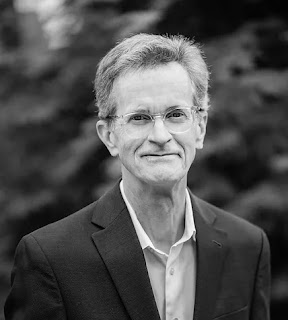Joel F. Johnson is the author of the new novel Never. He also has written the poetry collection Where Inches Seem Miles. He lives in Concord, Massachusetts.
Q: What inspired you to write Never, and how was the book's title chosen?
A: I grew up in the segregated South, and I can remember the debates Martin Luther King set off among members of my parents’ generation. I decided that the civil rights movement would form an excellent backdrop for a coming-of-age story.
Creating a fictional town allowed me to combine events from different years and places into one summer and place. One such event occurred in Selma, Alabama, where the county sheriff wore a button that said “Never,” as in, “We will never accept integration.” I was impressed that a single word could express so much belligerence.
Sheriff Jim Clark used “never” to describe the future, but “never” can be retrospective as well. When we say, “That never happened!” we’re denying someone’s version of the past.
The novel is told from the perspective of an old man looking back on the events of a summer in 1962. He realizes that he can’t reconcile his nostalgia for his childhood with the brutal reality of life in the Jim Crow South. In short, the boyhood he remembers never happened. He will need to revisit and reinterpret his past.
Q: The writer Meredith Hall said of the book, “In stunning prose, Johnson has written a powerful, deeply compassionate story about compelling characters struggling with complex issues that still determine lives today.” What do you think of that description, particularly as it relates to today's issues?
A: In his letter from a Birmingham jail, King expressed his frustration with white moderates, saying that they were more devoted to order than justice.
Characters in my novel feel forced to choose between protecting their families or joining the demonstrators in the streets. One could characterize it as a choice between order and justice. While the legal framework for segregation was torn down years ago, we haven’t eliminated the division of the races.
Today, when people advocate an antiracist agenda, they’re advocating for justice even at the expense of order. In the abstract, the choice seems obvious, but in personal terms, many of us equivocate or compromise, or simply elect to do nothing. Most of us lived through the mass incarceration of young Black men. How many of us protested?
Q: Did you know how the novel would end before you started writing it, or did you make many changes along the way?
A: I knew very little when I started writing Never. It may be my debut novel, but it’s not the only one I’ve written. I have a few others on my hard drive that represent failed attempts. Years ago, I discovered that the hardest part of writing a poem is writing the last line. I’d say the same for novels. How do you stick the landing after such a long buildup?
I’m happy with the way my novel ends. To me, it feels natural, but I know it isn’t. It is one of many possible endings, several of which I committed to paper. I like the ending because it flows from decisions made by the characters and not the other way around. In a literary novel, things shouldn’t happen to the characters. The characters should make things happen.
Q: How did you create your character Morris “Little” Nickerson?
A: I started with my own personality, stripped out the parts that didn’t serve the story, and added parts that would. The reader needs to believe that Little forms an unusually strong bond with the Black maid, Bit. To achieve that end, I needed to make Little’s parents colder than mine, and I needed to make Little even more neurotic than I am.
As a boy, I loved playing football. Not Little. He’s not the type to enjoy strapping on a helmet and crashing into people. People ask if I was nicknamed “Little” as a child. No, I wasn’t. I’m not Little, but I do like him very much.
Q: What are you working on now?
A: I still have the day job, and I’m devoting time to readings and book groups for Never. Beyond that, I have a rough outline for a novel that takes place in an old house on the North Shore of Boston. Ideally – I’m dreaming big here – it would be a modern version of a novel along the lines of Edith Wharton or Henry James.
When I begin writing it in earnest, I hope to spend fewer hours wandering in the dark. I’ll try to follow the outline. I think I may even know how this next novel ends.
Q: Anything else we should know?
A: I’ve been surprised to discover that writing a novel is a social endeavor. I wrote alone, but I invited friends, editors, and sensitivity readers to share their ideas, and I enjoyed that interaction. Since publication, I’ve received unexpected messages from cousins, childhood friends, and friends-of-friends. I love it, and I want more. I’m eager to hear from anyone who reads this book.
--Interview with Deborah Kalb


No comments:
Post a Comment